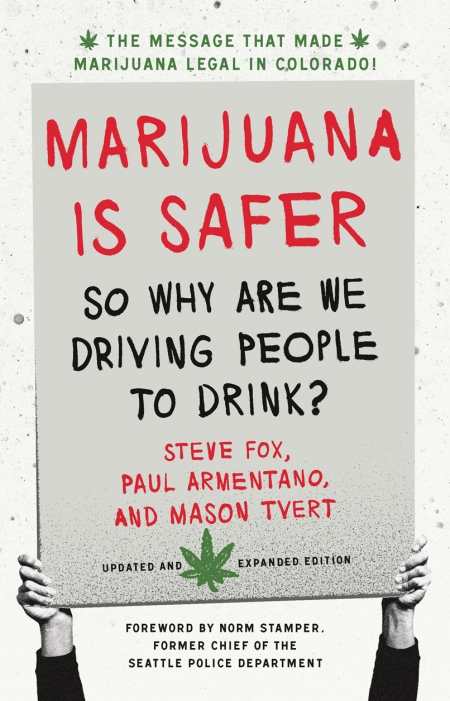
Marijuana Is Safer
So Why Are We Driving People to Drink?
Three authors behind Colorado legalization stir the pot of double standards on marijuana vs. alcohol.
The past year has seen a dramatic change in the national conversation about marijuana and its potential legalization. In November, voters in both Colorado and Washington supported legalization, and the use of medicinal marijuana has continued to expand. The three authors of Marijuana is Safer: So Why Are We Driving People to Drink? played a significant role in pushing passage of the Colorado ballot measure, and their book explains the focus of their advocacy strategy—using the legal status and ubiquity of alcohol as the basis to build a case for making marijuana equally legal.
The authors—Steve Fox, Paul Armentano, and Mason Tvert—argue their point effectively on a number of fronts, crafting a book with a well-structured political message. They touch on the history of American marijuana laws, the science of how marijuana creates a chemical high, and the statistics behind marijuana’s continued use despite its illegal status. They do go through some of the familiar arguments put forth by marijuana advocates, like the potential revenue from taxes on the drug, marijuana’s limited side effects when compared to other drugs, and the idea that police can be freed up to work on more serious crimes when they don’t have to spend time enforcing drug laws.
Then they pivot to their more creative argument, comparing cannabis to alcohol and highlighting where they see double standards at work. They use anecdotal examples of athletes having to apologize publicly for marijuana use while others pitch beer in commercials, or of political figures with brewing backgrounds cracking down on weed. They cite statistics about the negative societal impacts of alcohol, like binge drinking or drunk driving, and posit marijuana as no more dangerous. At times their arguments stretch a bit, such as when they imply alcohol company sponsorship is behind sports leagues punishing athletes for marijuana use, rather than the drug’s illegality. But overall they build a strong case for at least decriminalization.
Most of what’s covered in the book isn’t new material, but the authors are effective at collecting and presenting arguments that form a useful advocacy resource for legalization supporters and an interesting read for anyone wishing to learn more about the pro-legalization perspective. The book includes a chapter about how the authors used this argument during their years-long push for legalization in Colorado, and advocates working in other states will no doubt find their work an example and their book a useful tool.
Reviewed by
Jeff Fleischer
Disclosure: This article is not an endorsement, but a review. The publisher of this book provided free copies of the book and paid a small fee to have their book reviewed by a professional reviewer. Foreword Reviews and Clarion Reviews make no guarantee that the publisher will receive a positive review. Foreword Magazine, Inc. is disclosing this in accordance with the Federal Trade Commission’s 16 CFR, Part 255.
